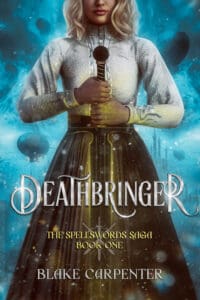Hello! I’m Katie Roome from Periapsis Press, and I am very excited to share with you an interview I did last week with indie author Blake Carpenter. The occasion is the release of a new cover for his book Deathbringer–a Gaslamp fantasy tale of necromancy and revenge, and the first in the Spellswords Saga.
I read and reviewed Deathbringer back in October 2023. At Periapsis Press we only write about good books we enjoy, so I heartily recommend it to anyone who finds it interesting!

In the interview below, we talk blade lore, inspirations, and of course the new cover!
But after picking Blake’s brain, I think his goal of telling a good, satisfying story that treats the reader with respect is what ultimately makes his stories feel authentic.
His attitude is certainly a welcome change from big mainstream authors who “lambast fans, attack political opponents, and demean conservatives” and actors who mock and talk down to audience members who do not share their political views.
RELATED: Starship Troopers: A Libertarian Narrative, Not a Fascist One
I hope you will enjoy hearing Blake’s responses to my questions!

Indie author interview with Blake Carpenter by Katie Roome:
Deathbringer is an exciting dark fantasy tale of revenge. Were there any specific stories from this genre that made an impact on you as a writer?
This is a good question. I think that a lot of formative stories for me were when I was a teenager and devouring anything D&D related—I recall the early Dark Sun novels were darker than the other stuff I read from DragonLance or Forgotten Realms, so I enjoyed that grittier sort of edge. I’ve got a Dark Sun-inspired fantasy I’d love to write some day, too.
Where did you draw inspiration from for this book? I think you have mentioned Russian history?
The inspiration for the Spellswords Saga unquestionably belongs to the Book of Swords series by Fred Saberhagen and the Elric of Melnibone by Michael Moorcock, but with an admitted twist: I haven’t actually read any of those stories, and I’m deliberately avoiding them until the Saga is done because I don’t want them to bleed into my creations accidentally.
RELATED: R.I.P. Baen Books Liaden Universe Author Steve Miller (1950-2024)
But other inspirations for the story would include the end of the Russian Empire (c. 1900-1920) and the Princess Anastasia story specifically, as well as World War I as a whole, a conflict I’ve always been fascinated by. I based the technology level of Deathbringer around the period of WWI deliberately, albeit with a fantasy twist (because it’s more fun that way).
What were some of the challenges and highlights of writing Deathbringer?
Without question, the primary challenge was figuring out what Deathbringer was about, as in whose story it belonged to. The world of Agareth had two entirely failed Young Adult novels written in it starring a completely different protagonist before Deathbringer itself finally began to take shape, and the novel itself even looks very different now than it did when I started it.
RELATED: Chengdu Worldcon Hugo Awards Rocked By Scandal Again With Sexual Assault Allegations
Inga Alenir, the main character, has changed roles several times from a sort of all-powerful Necromancer ice queen antagonist, to a vengeful, warring anti-hero more resembling the character of Katarina, Inga’s great-grandmother and inciter of a world war, until she finally took final shape as a reluctant heroine in a very personal revenge story.
I find the Spellswords fascinating, particularly Deathbringer. Can you discuss your blade lore at all? What can we look forward to as the series progresses?
Oh man, I could talk about blade lore all day.
Barring some reveals I want to keep to myself for the story itself, some of the lore is mentioned in the book: a powerful threat appeared centuries ago in the form of Worldbreaker, the “first Spellsword.” Other swords, including Deathbringer, were created to counter Worldbreaker and ultimately both its user and the Spellsword were defeated…but not destroyed. The question of where Worldbreaker is now and what to do about it is something I intend to answer by the end of the story.
These weapons might be powerful, but they’re also viewed by their owners and their families as being a curse as much as a blessing. The entire family history of Inga Alenir was forever changed because of the Deathbringer, a weapon that might be evil…or might just be misunderstood.
RELATED: Indie Military Fantasy Book Doomsday Recon By Ryan Williamson And Jason Anspach Blows Up On Amazon
I like contrasts and conflicts in the stories I write, and the idea of someone owning a super weapon that they’d rather not own at all is an interesting idea to me, and it’s something I hope to expand upon as the story continues. I’m also not sure how much of a spoiler it might be, but I will also say that not all Spellswords are created equal, and they weren’t all created at the same time, either.

Your book is getting a brand new cover! What did you like about the original? What inspired the changes?
I’ll admit having a soft spot for the original cover. My friend Mike Gallagher (@MissingByline on X/Twitter) was gracious enough to make the cover for me when I was broke and could afford a cover priced somewhere between “free” and “free,” and he made what I felt like a visually striking image of Deathbringer (the sword).
But I also knew Deathbringer (the book) was part of a larger series and I wanted the covers to be visually consistent, so Mike was gracious enough to give me his blessing when I asked him about getting a new cover. The new cover art was created by MiblArt (@miblart) who also designed the cover for my other book, The Way of Mortals, and I was so pleased by that one that I went back to ask if they’d make a new cover for Deathbringer as well.

You released The Way of Mortals, the first book of a new series, just a few months ago. Your short stories have also appeared in anthologies such as Swords and Maidens and our own Periapsis Christmas 2. How does Deathbringer compare with the other stories you have written?
Deathbringer (and the Spellswords Saga as a whole) would probably be the one story that’s stuck with me the most—some of the earliest concepts for it have been rattling around in my head for over 30 years at this point. So I might say the story is the “most personal,” in that I definitely want to get it told while I have the chance.
RELATED: Vox Day’s Epic Fantasy A Throne Of Bones Deplatformed By Amazon
Your story in Swords and Maidens is also a revenge tale, but from a very different perspective and with a different thematic conclusion. Can you comment on that?
“Three Swords” was a story about what heroes do after they retire—countless stories are already told about younger characters living in the moment and going on adventures, but what happens after you put the horses out to pasture for the last time and hang up the spurs for good? I’ve noticed that a lot of my fiction ends up containing quasi-Western ideas or motifs, and the idea of the cowboy having to strap his six guns back on after retirement isn’t a new one.

I also did what I always do and ended up completely flipping the entire point of the story collection on its head (if you’re reading this, N.R. LaPoint, my *profoundest* apologies for that)—namely, what kind of story could I tell where the “maiden” was already lost? Ultimately, Fiana, the protagonist of “Three Swords,” and her husband Basil fight to claim their vengeance for that lost maiden and hope to ride off into the sunset together to enjoy their hard-won happy ending.
Would you share a bit about your values and how they influence your stories?
Sure. I’ve been a Christian all my life, unashamedly. The problem is that “Christian media” largely sucks, whether it’s the Super Christian films I had to suffer through as a teenager at church or God’s Not Dead of this generation. People want good stories that don’t beat the message into their skulls with a 2×4.
My values and morals are important in the stories I write, but not necessarily the ultimate judge in what stories I decide to tell. Deathbringer is a dark story of murder and revenge, but its heroine doesn’t mercifully decide to forgive the woman who wronged her—she’s the arbiter of her own vengeance and refuses to give it up. My other book, The Way of Mortals, is about an assassin who does what assassins do, including outright violence and murder to protect the ones she loves.
RELATED: DOOMSDAY RECON: A Five Star Military Fantasy by Ryan Williamson & Jason Anspach
But there are other themes that would align closer to my morals including the importance of loyalty, familial and even romantic love, and so on. Dark themes and subject matter, even “questionable” subject matter, can exist for a good reason; I’ve loathed the word “problematic” for years because ultimately the question is who decides what’s a problem and what isn’t. Someone like me can tell a good, riveting, impactful story with a set of morals that might not equate to my own without preaching at my audience.
What do you hope readers take away from Deathbringer?
It’s my hope that readers take two things away from Deathbringer, or any of my stories: 1) a desire to read the rest of my work and any sequels I’ve written in that same world; and 2) the satisfaction and enjoyment of reading a good, well-written story that they’d enjoy reading again.
Whether they come out through traditional publishing, indie publishing, #Ironage, whatever, people just want a good story that’s entertaining and doesn’t treat them like a sucker or a fool. Good stories WILL rise to the top and be found, eventually. That’s my hope, anyway.
Do you find it encouraging when indie authors such as Blake Carpenter prioritize your entertainment and treat their readers with respect? Let us know in the comments!

Leave a Reply